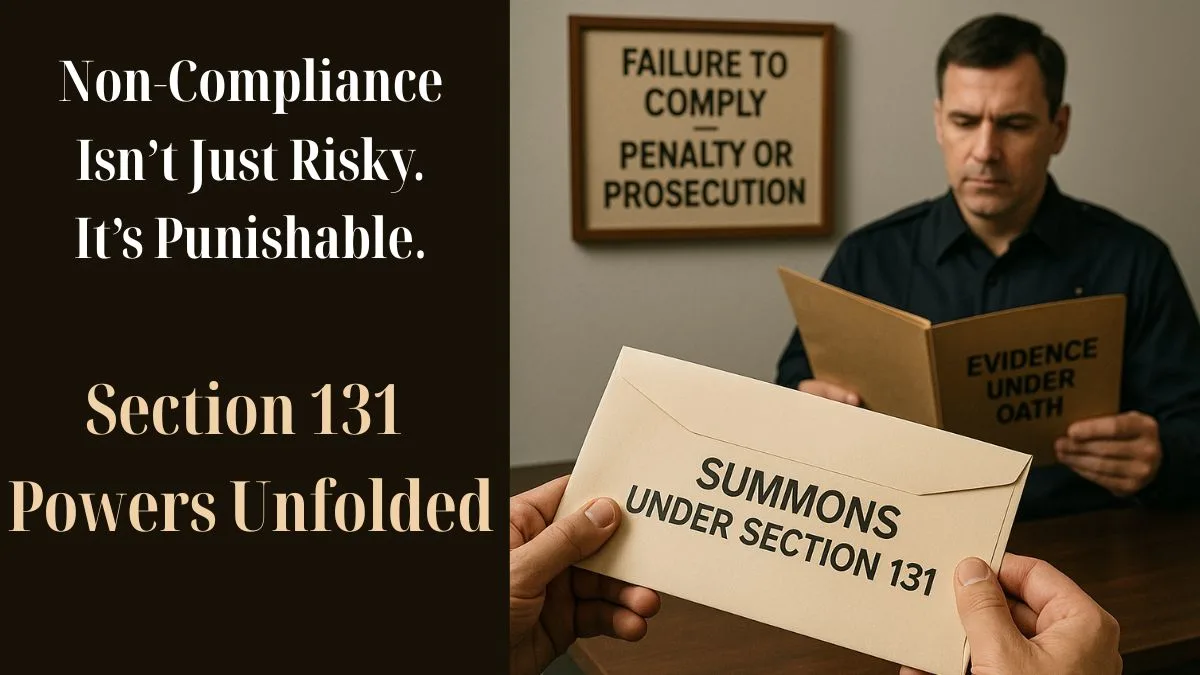
In the world of tax enforcement, information is power. Section 131 of the Income Tax Act grants this power to the Income Tax authorities, empowering them to conduct thorough investigations when necessary. From issuing summons to inspecting documents, this provision ensures that the tax department can unearth concealed income & track non-compliance.
Whether you're a business owner, a salaried employee, or just someone trying to stay on the right side of tax law, it’s essential to understand what Section 131 of the Income Tax Act entails.
What is Section 131 of the Income Tax Act?
Section 131 of the Income Tax Act provides the Power regarding discovery, production of evidence, etc., to certain income tax authorities. It allows them to function similarly to a civil court while handling tax matters that require deep scrutiny.
In simple terms, Section 131 empowers the officers of the investigation wing to summon individuals, inspect documents, & enforce attendance, especially during assessments, reassessments, or scrutiny.
Key Powers Under Section 131
Here’s what the Income Tax authority can do under this section:
- Summons for Evidence & Documents
Authorities can issue notices & summonses to taxpayers and related individuals for providing relevant documents or attending inquiries. These powers are similar to those granted to civil courts under the Code of Civil Procedure.
- Discovery & Inspection
This provision allows officers to discover hidden transactions, inspect records, & call for any books of accounts. The intention is to dig deeper into suspicious transactions or undeclared income.
- Income Tax Authority Can Enter Business Premises
An Income Tax authority can enter any place of the concerned person during business hours to access documents or evidence necessary for the investigation. This isn’t the same as a search or raid, but it’s powerful enough to compel compliance.
- Statement Recording & Witnesses
Section 131 empowers tax officials to record statements under oath & demand the presence of witnesses. These statements carry evidentiary value & may influence the outcome of the tax proceeding.
Applicability of Section 131
This section comes into action when the Assessing Officer or other designated income tax authorities suspect tax evasion, unreported income, or inconsistencies in tax returns. The aim is to facilitate a full-fledged inquiry to establish the truth based on facts, not just paperwork.
Authorities that can exercise these powers include:
- Assessing Officers
- Joint Commissioners
- Commissioners (Appeals)
- Commissioner of Income Tax (CIT)
- Director General or Director of Investigation
These officers can use this section before or after issuing a notice under sections like 143(2), 147, or 148."
Real-World Example
Suppose the tax department receives a tip-off that a taxpayer is running multiple businesses under one PAN but only reporting one. If they find mismatches between GST data & ITR filings, they can invoke Section 131 to demand records, bank statements, & even summon the taxpayer for questioning.
Section 131 vs. Section 133A
People often confuse Section 131 with Section 133A, which deals with surveys & raids. Here's the difference:
- Section 131 is for inquiry & document production with prior notice.
- Section 133A involves sudden surveys without advance intimation.
So, if you receive a notice under Section 131, it’s more about allowing you to explain or clarify, not a raid. "
Consequences of Non-Compliance
If a person ignores a summons under Section 131 or fails to produce required documents, it may lead to:
- Penalty proceedings under Section 272A
- Adverse inference in tax assessments
- Potential prosecution under Section 276D for willful default
Conclusion
In essence, Section 131 of the Income Tax Act is a powerful tool that gives the tax department the right to probe deeper when they suspect foul play. From summoning individuals to inspecting documents & premises, it ensures transparency & accountability in the tax system. Every taxpayer should be aware of this section to avoid unnecessary legal trouble & respond promptly to any notices issued.
💡 Pro tip: Received a notice under Section 131 & don’t know what to do next? Our expert tax consultants at Callmyca.com can guide you through it step-by-step. Click now & protect yourself from legal pitfalls!











